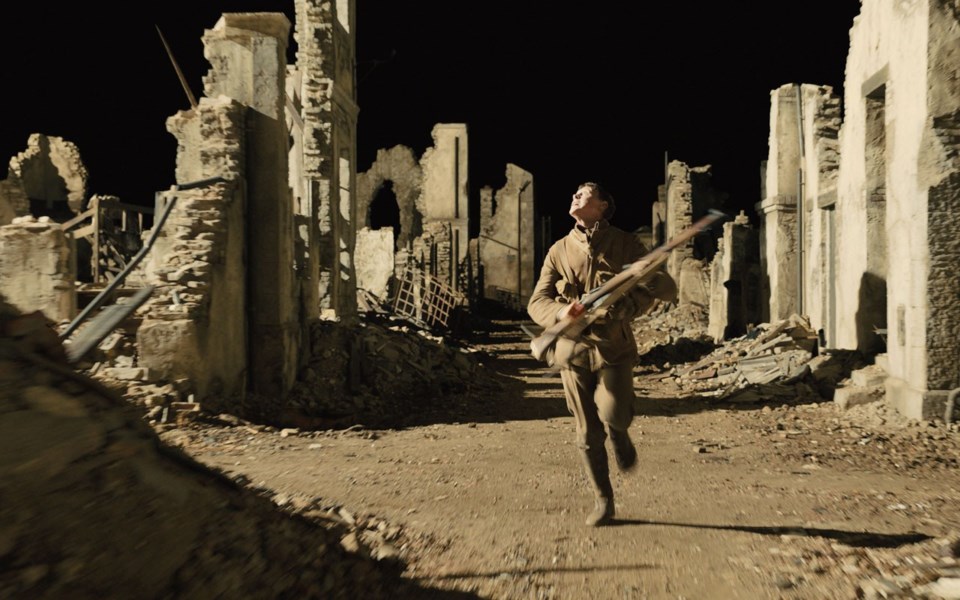By Feet Banks
So the Download of the Week is Wag the Dog, a 1997 flick about a douchey American president facing scandal who fabricates a war to draw attention away from his real crimes. Dustin Hoffman and Robert De Niro star in a great flick that wasn't really intended to be read as a prophecy, but here we are.
Serendipitously, war plays a big role in the new films at the Whistler Village 8 this week. Fresh off some big victories at the Golden Globes, 1917 is a First World War epic from English director Sam Mendes (American Beauty, Jarhead, Skyfall). Mendes co-wrote the script based on stories his own veteran grandfather used to tell.
Unlike the Second World War, the First World War had no iconic villain and no clear moral cause—what started as a regional skirmish between Austria/Hungary and Serbia somehow led to millions of people dying in trenches and the worst conflict in human history to that point. It was a real mess of a war, one that has proven difficult to properly retell in a dramatized film.
Rather than tackle the muddy moral/political/ideological angles, Mendes keeps his story incredibly personal—two British soldiers are sent on a near-impossible mission to hike through no-man's land in order to warn another battalion that is about to charge into a trap on the frontline. While the horrors of war are definitely on display, 1917 is more about courage, camaraderie, and the tension of a ticking-clock amidst some of the most expertly staged camera work in the history of cinema.
Shot by legendary British cinematographer Roger Deakins (14 Oscar nominations including a win for Blade Runner 2049), 1917 is staged to look like it was filmed in one single take—a "gimmick" that works exceptionally well with an intimate, timeline-driven story featuring unknown actors pushing through hell on earth.
If anything, Deakins shoots war so beautifully you almost lose a bit of the horror. There are rats and dead bodies, sure, but it's all so beautiful, too. On the technicality alone, however, 1917 is a must see.
Side note: one-shot filmmaking is nothing new; Orson Welles opened 1958's Touch of Evil with an epic, swooping 3.5-minute ticking time bomb one-shot through the streets of a U.S.-Mexico border town. More recently, Mexican cinematographer Emmanuel Lubezki has been pushing the boundaries of one-shot technique with such flicks as Children of Men, The Revenant, and Birdman, which was also edited to seem as if it were a single take. For the record, Russian director Alexander Sokurov and cinematographer Tilman Büttner actually did film the entire 96-minute Russian Ark in one single shot with no edits. They used over 2,000 actors, shot in 33 rooms of the Winter Palace at St. Petersburg, and apparently nailed it on the fourth take. Impressive.
The other war flick opening this week is Taika Waititi's Jojo Rabbit, one of the best films of 2019. Ten-year-old German boy Jojo Betzler lives with his mother and spends his most of his spare time at a Nazi youth camp (which is little more than a Cub Scout club in his childish perspective). Jojo also has an imaginary friend, Adolf Hitler.
After a not-as-bad-as-it-could-have-been hand-grenade accident sees Jojo spending more time at home, he discovers Elsa, a slightly older Jewish girl living in a cupboard upstairs. Brainwashed though he may be, Jojo is still just a kid, and as his friendship with Elsa blossoms, the truth about the rest of his world starts to unravel.
Jojo Rabbit is a sweet, hilarious, and touching coming-of-age story set amongst some of the most horrific human evils imaginable. Waititi pulls it off by delivering the horrors through the perspective of a kid, even as the audience sees behind the curtain. The result is an incredible film about the innocence of childhood, the power of love, and how utterly stupid and inhuman war can be.
Good messages now, and always.




